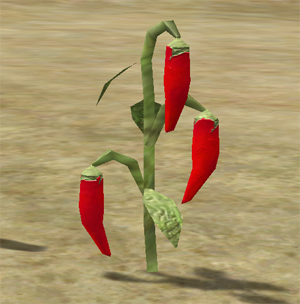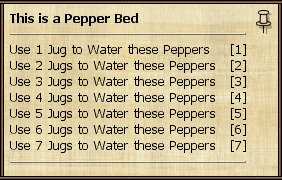The Wiki for Tale 6 is in read-only mode and is available for archival and reference purposes only. Please visit the current Tale 11 Wiki in the meantime.
If you have any issues with this Wiki, please post in #wiki-editing on Discord or contact Brad in-game.
Difference between revisions of "Peppers"
Guildenstern (talk | contribs) |
Guildenstern (talk | contribs) m (→Yield: updated based on recent research) |
||
| (One intermediate revision by the same user not shown) | |||
| Line 16: | Line 16: | ||
'''([[User:Hekatef|Hekatef's]] Notes:''' It seems to me that a pepper plant becomes ready to harvest when it reaches a certain size. Depending on how much it grows with each step, it may reach this size with few waterings or with many. If it is watered in such a way that it grows a large amount with each step, then it reaches that height quicker and requires fewer waterings to harvest. Consequently, watering it in such a way where each growth is minimal means it will require many steps to reach harvestable size. What impact any of this has on pepper yield, I don't know.) | '''([[User:Hekatef|Hekatef's]] Notes:''' It seems to me that a pepper plant becomes ready to harvest when it reaches a certain size. Depending on how much it grows with each step, it may reach this size with few waterings or with many. If it is watered in such a way that it grows a large amount with each step, then it reaches that height quicker and requires fewer waterings to harvest. Consequently, watering it in such a way where each growth is minimal means it will require many steps to reach harvestable size. What impact any of this has on pepper yield, I don't know.) | ||
| − | [[User:Guildenstern|Guildenstern's]] Notes: Based on some simple testing it would seem that the result of overwatering a pepper plant is to overwrite the last water applied to that particular plant. For instance, if you were seeking a 1|1|1|1|1|1|2 sequence and you instead overwatered on the next to last set you would have 1|1|1|1|1|2|? and be one water short for your harvest. In practical testing, this allows you to correct any mistakes or intentionally delay a pepper plant from maturing by one cycle, much like an onion when overwatered. | + | [[User:Guildenstern|Guildenstern's]] Notes: Based on some simple testing it would seem that the result of overwatering a pepper plant is to overwrite the last water applied to that particular plant. For instance, if you were seeking a 1|1|1|1|1|1|2 sequence and you instead overwatered on the next to last set you would have 1|1|1|1|1|2|? and be one water short for your harvest. In practical testing, this allows you to correct any mistakes or intentionally delay a pepper plant from maturing by one cycle, much like an onion when overwatered. Pepper yield seems to be related to the size of the pepper, specifically the size above a certain harvest threshold. This harvest threshold accounts for why some watering patterns are longer to harvest than others. The method I have been employing recently involves reaching the harvest threshold and optimizing the growth above that point. (specifically searching for low yield combinations, then searching for a watering that will give me the most growth without harvest on the last watering, then running the newly avalible water for the largest growth) |
As with [[onions]], overwatering will not kill a pepper plant. <s>It may reduce your yield, though.</s> | As with [[onions]], overwatering will not kill a pepper plant. <s>It may reduce your yield, though.</s> | ||
| Line 24: | Line 24: | ||
Pepper yields vary. It is believed that an optimal pepper yield requires a correct "combination" of waterings; moreover, the correct combination may change from day to day. | Pepper yields vary. It is believed that an optimal pepper yield requires a correct "combination" of waterings; moreover, the correct combination may change from day to day. | ||
| + | Pepper yield appears to be evaluated based on the growth(size) above a particular point where the pepper is harvestable. As such, optimal yields will have the largest final growth size. | ||
==Uses== | ==Uses== | ||
Latest revision as of 07:36, 12 January 2012
Peppers are a type of vegetable introduced early in Tale 6. They are grown on dirt terrain from pepper seeds. They are used in cooking, and can be grilled in a Firepit. Grilled peppers provide a temporary +1 Strength and +1 Dexterity, effectively increasing carrying capacity by 500 for 10 minutes.
Not to be confused with Black Pepper Plant, Red Pepper Plant, or White Pepper Plant, all of which are herbs.
Cultivation
To grow peppers, plant a pepper seed in a dirt area. Water the plant immediately, and water it again each time it changes size. Harvest once the option appears.
Peppers grow a little differently from other vegetables. At every chance to water, you have the option to add from 1 to 7 water. The number of times a pepper plant grows before harvesting varies; normally it is 7 but it can be more, or as low as 5. Similarly, the degree to which the plant grows is variable: sometimes it will grow much larger in a single step, other times only a tiny amount.
Asnath tells Taemon: Pepper yield changes every Egypt day. To find out which watering pattern gives the highest yield, try finding which watering makes the plant grows fastest. Pepper is harvestable after the plant reaches a certain size. You'll want to water it in such a way as to make it grow the fastest. This will take about eight watering. Thanks Asnath!
(Hekatef's Notes: It seems to me that a pepper plant becomes ready to harvest when it reaches a certain size. Depending on how much it grows with each step, it may reach this size with few waterings or with many. If it is watered in such a way that it grows a large amount with each step, then it reaches that height quicker and requires fewer waterings to harvest. Consequently, watering it in such a way where each growth is minimal means it will require many steps to reach harvestable size. What impact any of this has on pepper yield, I don't know.)
Guildenstern's Notes: Based on some simple testing it would seem that the result of overwatering a pepper plant is to overwrite the last water applied to that particular plant. For instance, if you were seeking a 1|1|1|1|1|1|2 sequence and you instead overwatered on the next to last set you would have 1|1|1|1|1|2|? and be one water short for your harvest. In practical testing, this allows you to correct any mistakes or intentionally delay a pepper plant from maturing by one cycle, much like an onion when overwatered. Pepper yield seems to be related to the size of the pepper, specifically the size above a certain harvest threshold. This harvest threshold accounts for why some watering patterns are longer to harvest than others. The method I have been employing recently involves reaching the harvest threshold and optimizing the growth above that point. (specifically searching for low yield combinations, then searching for a watering that will give me the most growth without harvest on the last watering, then running the newly avalible water for the largest growth)
As with onions, overwatering will not kill a pepper plant. It may reduce your yield, though.
Yield
Pepper yields vary. It is believed that an optimal pepper yield requires a correct "combination" of waterings; moreover, the correct combination may change from day to day.
Pepper yield appears to be evaluated based on the growth(size) above a particular point where the pepper is harvestable. As such, optimal yields will have the largest final growth size.
Uses
- Cooking
- Consuming grilled peppers provides +1 Str/+1 Dex for 10 minutes
Seed Reproduction
Seed method is unknown, however the achievement exists in egypt, therefore the method for production of seeds is avalible at present.
See also
The general vegetables page, as well as Cabbage, Cucumbers, Eggplant, Garlic, Leeks, Onions.

